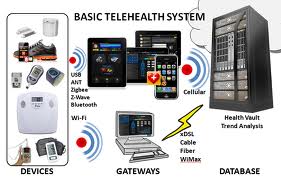By Robert Rowley, MD
The way we pay for healthcare is changing. The transition from fee-for-service (“fee for volume”) to value-based care is beginning to take shape, and will do so increasingly in the next few years. Federal pressures as well as private industry pressures are driving this change, as reviewed nicely in a white paper by Houlihan Lokey, “Value-Based Care.”
By Robert Rowley, MD
The way we pay for healthcare is changing. The transition from fee-for-service (“fee for volume”) to value-based care is beginning to take shape, and will do so increasingly in the next few years. Federal pressures as well as private industry pressures are driving this change, as reviewed nicely in a white paper by Houlihan Lokey, “Value-Based Care.”
 But do we have the right tools? Value-based care implies that health care delivery be coordinated across all the different settings of care that a patient navigates. It implies effective population health management, where strategies and interventions to defined groups of people measurably improves health outcomes. It implies that intelligent individualized care plans be developed, driven by evidence-based clinical pathways as well as Artificial Intelligence (AI) pattern recognition. These are new workflows, needing new tools.
But do we have the right tools? Value-based care implies that health care delivery be coordinated across all the different settings of care that a patient navigates. It implies effective population health management, where strategies and interventions to defined groups of people measurably improves health outcomes. It implies that intelligent individualized care plans be developed, driven by evidence-based clinical pathways as well as Artificial Intelligence (AI) pattern recognition. These are new workflows, needing new tools.
It will be a real stretch for current Electronic Health Records (EHR) systems to achieve the kinds of changes needed for a value-based environment. EHRs are built around provider-centric data, and have created institution-centric data silos that are an impediment to shared care plans. Traditional data sharing has been through Health Information Exchange (HIE) hubs that attempt to link subscribers together, passing copies of a subset of clinical data in a query-response fashion one record at a time, while leaving the underlying data silos intact. This approach is not scalable, especially as the sheer volume of health data increases exponentially. It does not lend itself to population-based analysis, does not facilitate emerging AI capabilities for assisting in smart individualized Care Plan development, and does not address care coordination across multiple settings of care which may be utilizing different EHR systems.
Centralized aggregated data is the next step in care evolution
Increasingly, we are seeing the emergence of the vision that simple query-response one-record-at-a-time data sharing is not enough. What we need is a unified repository of normalized data organized around a patient as the center (rather than the institution as the center). These efforts are appearing (at various levels of maturity) at the local level, at a regional level, and at a national level. Some efforts are still hindered by a legacy vision of “provider-centricity,” while others recognize the importance of the patient being at the center of his/her own data with ability of the patient to see the data and manage permissions around data sharing.
With this kind of data platform, we can see the evolution of the kinds of tools needed for value-based care. We can see population-based analytics that can perform risk stratification into various segments of healthcare need, allowing effective and targeted outreach and care management efforts to take place. We can see measurement of quality (such as HEDIS measures) that can take place automatically, reducing the manual administrative burden to individual practitioners which has been such a headache to many. We can see avoidance of duplication of services, so that test results already done somewhere else will appear to all involved in the care of a patient as though it was native to each clinician’s system. We can see a new type of application layer that tailor views into the shared data, appropriate for each observer – the patient, the various types of clinicians, hospitals, and payers.
A new healthcare operating system
The centralized, aggregated data, when designed properly, can function like an operating system. Apps for individuals, as well as population-based analytics services, all interact with the common data set. They therefore do not need to build interfaces to each other (greatly reducing their cost). Instead, they each simply work off the same shared data (using modern APIs) – updates by any such app can be seen by any other, within the parameters of their permissions.
As with modern smartphones, the apps used by one person may be different than those used by the next person, but they all ride on the same operating system and can share data with each other. An example might be this: consider responding to a calendar invite request received via email, and seen within an email app on your phone, and when you reply to accept the invite, the calendar event can be viewed using your phone’s calendar app. You did not have to open the calendar and manually create the appointment – it was placed there automatically. This kind of cross-functionality is what a unified operating system can deliver.
That is how health IT needs to work in a cross-institution value-based care environment. That is what is needed to facilitate the new workflows that arise in the emerging payment settings. That is why we refer to the platform we are building at Flow Health as the “operating system for value-based care.”
Thank you for taking the time to learn about Flow Health. Flow Health is presenting at HIMSS 2016 Venture+ forum. We invite you to see all of our #HIMSS16 posts. If you would like to know more about Flow Health and how we can help your organization succeed, please contact us today at sales@flowhealth.com.






